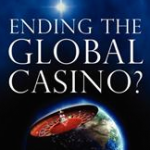I promised you a summary of my blogs about economic growth. Here is the summary of the last six  blogs. The sunmmary of the first five blogs was published October 30.
blogs. The sunmmary of the first five blogs was published October 30.
In the sixth blog I stated that no organism, no society, can live and survive without growth. So, if we want or have to stop material economic growth, we have to substitute it for another form of growth. What we need is not material growth, but cultural and spiritual growth. Personal development is a necessary prerequisite for that.
In the seventh blog I started to elaborate this idea. If we want to develop cultural and spiritual growth the first step is that we have to become a learning society. We nowadays are learning insufficiently from the mistakes we made in the past. In order to learn we have to be open minded. We shouldn’t stick to dogmas, preconceived ideas, ideologies and opinions. In order to learn to be more open minded we should collectively invest in cultural institutions and activities: education, philosophy, art, science, and independent broadcasting.
In the next blog I stated that another prerequisite for our detachment from material needs is experiencing freedom. Freedom from external pressure and coercion, freedom from inner setbacks, such as fear and rigid ideas and behavior patterns, and freedom to do and speak as one pleases. So a second value upon which our society should be based, apart form open mindedness, is freedom.
 The ninth blog: Our most effective defense against terrorism is not more violence, but defending our moral values. Unfortunately in our foreign policy we pervert and violate these values permanently. As a result the so called Western societies are hated among the people in the world, thus says terrorism expert Peter Knooke. This is a fertile breeding ground for terrorism. Then defending our values is becoming a form of hypocrisy. So the first thing we have to do is changing our foreign policy, that until now had only one goal: promoting and defending our economic growth, no matter what. So not making economic growth our primary target will have very important positive consequences..
The ninth blog: Our most effective defense against terrorism is not more violence, but defending our moral values. Unfortunately in our foreign policy we pervert and violate these values permanently. As a result the so called Western societies are hated among the people in the world, thus says terrorism expert Peter Knooke. This is a fertile breeding ground for terrorism. Then defending our values is becoming a form of hypocrisy. So the first thing we have to do is changing our foreign policy, that until now had only one goal: promoting and defending our economic growth, no matter what. So not making economic growth our primary target will have very important positive consequences..
A value that has to be added to the ones mentioned above is respect: respect for Creation, for Life, for ourselves and for each other. That will diminish our addiction to economic growth as well.
In the tenth blog I emphasize again that economic growth does not improve employment opportunities, in contrast to what most economists tare thinking. There are better means: reduction of working hours and creating jobs paid by the government in the domain of public service. This should be financed by income taxes and eco taxes. Unfortunately, contrary to what is thought, this does not diminish economic growth, because the economic contraction by higher taxes is compensated by the expansion of jobs.
Furthermore in this blog I elaborate on the value of respect. What we need is more spirituality (not religion!): awe for the Source of everything and its manifestation. Spiritual growth will help us with getting free from the addiction to material growth.
 As a conclusion I state again that the end of economic growth in the West will happen soon. The only choice we have is between a sudden crash of our financial system, or a soft, controlled landing. One of the reasons why I prefer the last possibility, is that thus we make room for the necessary growth in the poorest countries of the world.
As a conclusion I state again that the end of economic growth in the West will happen soon. The only choice we have is between a sudden crash of our financial system, or a soft, controlled landing. One of the reasons why I prefer the last possibility, is that thus we make room for the necessary growth in the poorest countries of the world.
(I apologize for mistakes in my English. Blogs are cursory – not stuff for correction by a native speaker).


